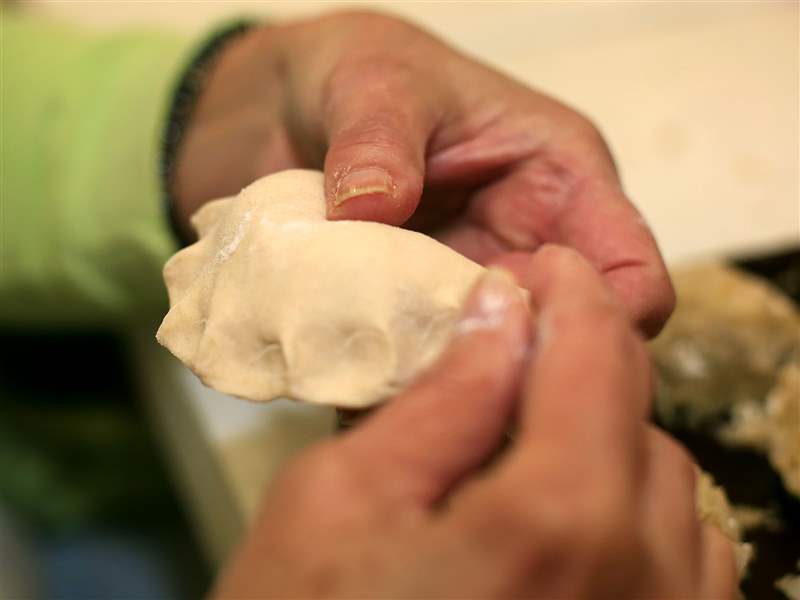
Toledo parish preparing its annual Wigilia event
12/4/2017
Janet Gniewkowski pinches pierogi at All Saints Catholic Church in Rossford, Ohio, on June 26.
The Blade/Kurt Steiss
Buy This Image
It’s beginning to look very festive at Saints Adalbert and Hedwig Parish, 3233 Lagrange St., where the annual Wigilia — pronounced with a hard “g,” as vih-GILL-iyah — will be held in the school hall on Saturday after the 4 p.m. Mass. The event is a Polish custom: a vigil traditionally held Dec. 24 among families awaiting Christmas Day.
But congregants are hosting this one early, the Rev. Monte Hoyles said, so that they can enjoy the time together “as a parish family” without scheduling complications as Dec. 25 approaches. Reservations for the popular event have closed.
The word Wigilia “is a derivative of vigilare,” a Latin word meaning “the eve or to anticipate,” Father Hoyles said. Thus, it’s “the vigil of the holiday,” an event the church has hosted for more than 10 years.
To begin the evening, parishioners will “share the oplatki,” said the priest, by distributing delicate, Communion-like wafers embossed with scenes from the Nativity. There will also be prayers for good health and the singing of beloved koledy, or Polish carols.
And then, after having fasted for the day, assembled guests will enjoy a special meal that always features an odd number of dishes, specifically vegetarian ones.
“Probably 20 people, give or take” will prepare the feast on Friday and Saturday, said Marge Stefanski, with some focusing upon their specialties and others pitching in to help where needed. “We’re proud of cooking,” she said. “These ladies would be very insulted if they weren’t invited” to do so.
Fish will be breaded and baked, but no other details were forthcoming. “They have their little secret recipe,” Mrs. Stefanski said of the women who regularly prepare this dish. As with all the specialty items, instructions have “been handed down generation to generation,” she said. Everyone tastes the food as it’s being prepared, critiquing until consensus has been achieved that it’s just right.
Red barscz — the Polish variety of beet soup more familiarly known as borscht — is also on the menu, as it is served at Christmastime because of its color. Its preparation, too, is a closely guarded secret. Assistants prepare the beets, and then “one of our Polish ladies” comes in and mixes up the soup “like magic,” Mrs. Stefanski said.
Pierogi for the dinner are being prepared by the Echoes Of Poland Folk Song and Dance Ensemble, which was founded 50 years ago by Paulina Ortyl to keep cultural traditions alive. Church members like to support the organization, said Mrs. Stefanski. And “we know theirs are good,” she said of the traditional filled dumplings. Children from the troop will perform at the Wigilia, Father Hoyles said. “Kids dancing is another way” of maintaining a connection to Polish heritage.
The menu will be rounded out with savory dishes such as rice and mushroom-stuffed golabki (cabbage rolls), sledzie (pickled herring), and mizeria (creamy cucumbers), as well as sweets including placek (Polish coffee cake), kompot z suszu (fruit compote), and chrusciki (angel wing cookies).
Although waiting and anticipation are integral to the Wigilia, it isn’t somber or tense. It is a celebration, one with a “spiritual element,” said Father Hoyles.
“It isn’t only about a meal together,” he said. There will be “straw underneath the tablecloth to represent Jesus Christ being born in a manger.” And an empty chair is always left open for the unexpected guest.
“We remember what we’re keeping vigil for,” Father Hoyles said. There’s a “richness to this meal. What others see as a meatless meal is really much, much more.”
Contact Mary Bilyeu at mbilyeu@theblade.com, and follow her at facebook.com/thebladefoodpage.